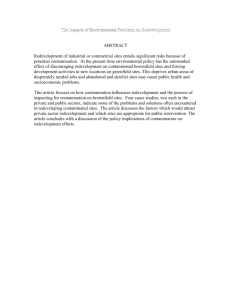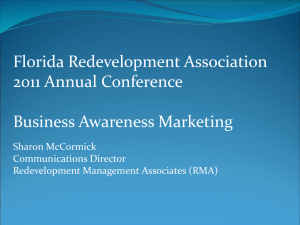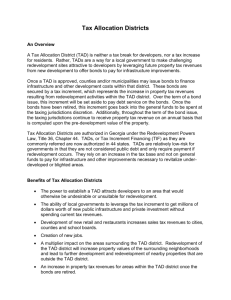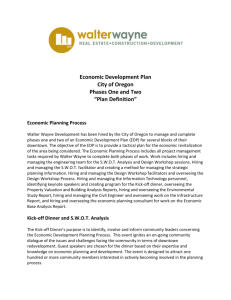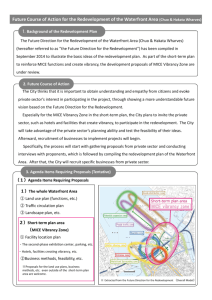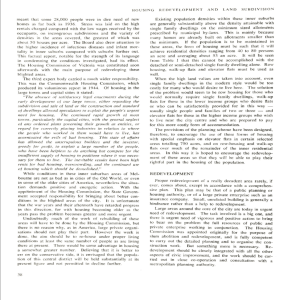Steve Andrews, Special Assistant to Los Angeles Mayor Antonio
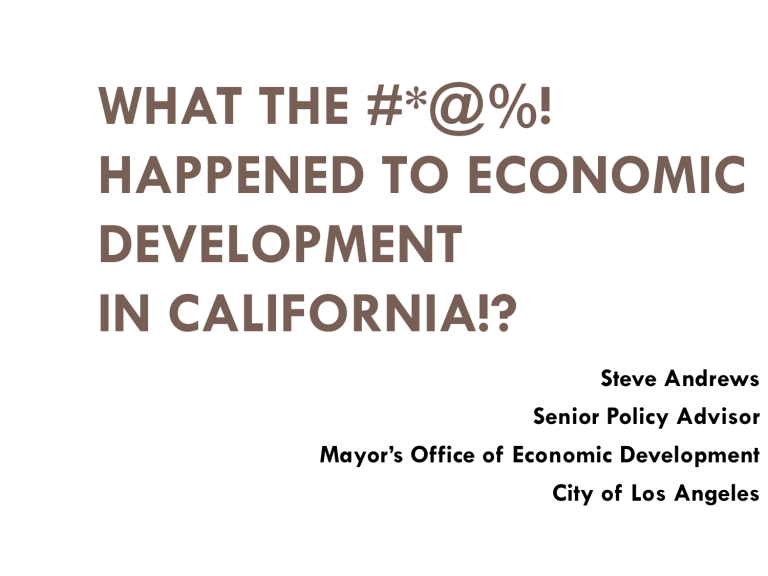
WHAT THE #*@%!
HAPPENED TO ECONOMIC
DEVELOPMENT
IN CALIFORNIA!?
Steve Andrews
Senior Policy Advisor
Mayor’s Office of Economic Development
City of Los Angeles
What Happened????
1
2010 – 2011: A perfect storm
2
Economic development impact
3
Now what? (who is still in the game)
4
Organizational responses
2011-2012:
A PERFECT STORM
Bottom line:
425 California redevelopment agencies dissolved on
Feb 1
60 year tax increment financing structure for economic development eliminated
$57 billion in direct tax increment financing over last 11 years
Funds are not coming back – disbursed to “taxing entities”
Some key economic development tools are eliminated or potentially compromised
Huge professional resource in public agencies and supporting private firms will be lost
2011-2012: A perfect storm
SETTING THE STAGE: “ballot box budgeting”
1970’s -- Proposition 13 skews state and local budgets; growing shift of tax burden to residential over 30 years
But, Prop 13 is still called the “third rail” of Calif. Politics
“fiscalization of land use” – cities chase sales tax
(retail) to support local budgets
other sectors: not so much
2011-2012: A perfect storm
Recently:
State budget over-reliant on income tax; huge swings in revenues; structural deficits
Proposition 98 – schools are guaranteed specific share of state budget
Proposition 22 – cities, redevelopment agencies, uniformed services freeze out state from taking “local tax resources” to balance state budget
2011-2012: A perfect storm
2011 – Governor Brown proposes to end redevelopment, so more $$ would flow to schools
Relief to state budget by reducing Prop 98 “backfill” requirements
Legislature says “no” (sort of)
2011-2012: A perfect storm
SPECIAL LEGISLATIVE SESSION COMPROMISE
Two bill package deal:
AB 26: Dissolves redevelopment and tax increment structure ….. Unless….
AB 27: Cities allowed to pay “voluntary” ransom to state to keep tax increment structure
2011-2012: A perfect storm
Cities sue AB26 and AB27as a violation of
Proposition 22
Supreme Court: AB 27 IS in fact a ransom – so “no deal” under Prop 22
BUT, AB26 stands – redevelopment agencies and the tax increment structure are dissolved
ECONOMIC DEVELOPMENT IMPACT
Between 1998-1999 and 2009-2010, redevelopment agencies in California received $56 billion and produced:
New Commercial 181 million sf
New Industrial
Public Improvements
200 million sf
30 million sf
Other (Community, etc)
114 million sf
Total 525 million sf
Economic development impact
Rehabilitation of commercial, industrial and other: 128 million sf
Affordable Housing created:
-- New:
-- Rehab:
94,887 units
58,518 units
PLUS: “pass through” payments to counties, schools, special districts: $9.7 billion
Estimated Jobs created: 682,000
Economic development impact
•
Primary Redevelopment Economic Development
Tools:
–
–
–
Infrastructure rehabilitation and development
Land assembly
Brownfields remediation
–
–
–
–
–
Catalyst for commercial/industrial attraction
Affordable housing development
Community facilities
Local match for federal, state, private funding
Professional staff capacity – public and private
NOW WHAT?
(who is still in the game?)
•
Federal (partial list)
–
–
–
–
CDBG
Transportation
New Market Tax Credits
Investment Tax Credits
–
–
–
–
–
USDA for rural areas
SBA
EB5 Visa Program
EDA
More….
State
GO Bond Programs
Enterprise Zone Program
Focused Tax Incentives
Infrastructure Funds
More….
(who is still in the game?)
(who is still in the game?)
•
Local
–
–
–
–
–
–
–
Infrastructure Tax Districts (Mello-Roos)
Business Improvement Districts (BIDS)
General Fund Allocations
Fees, exactions
Public-Private Partnerships
Property Tax Rebates
Other (non fiscal): density bonuses, protective zoning, code enforcement, expedited environmental review
(who is still in the game?)
Remaining Economic Development Pipeline:
Will take 2-3 years to complete any economic development projects with “enforceable obligations”
Local Governments can “retain” all housing assets and obligations, but no new funding
Local Governments will capture some % of the former tax increment $$, but only as pipeline projects are completed and bonds are paid off
BUT – huge competition for these funds, as cities generally have major resource constraints last five years and before
Organizational Response
How do California local governments now organize for economic development?
New charter/ordinance authorities for using economic development tools?
Creation of new structures?
New city economic development departments
New non-profit economic development entities
New hybrid structures

